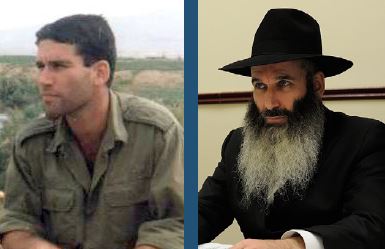 The caller’s voice was low and soft. She came across as a gentle and sensitive person. Although already agreed to the fifth date scheduled for tomorrow, she feels increasingly confused about it.
The caller’s voice was low and soft. She came across as a gentle and sensitive person. Although already agreed to the fifth date scheduled for tomorrow, she feels increasingly confused about it.
“I don’t know if I am making a big fuss out of nothing or if my concern is serious enough to cancel the date.”
Her father thought that this guy was the ‘ultimate bochur’ for her. Her mom was a little less enthusiastic, but overall, in agreement with her husband. Her parents suggested she call me for a reason. The father called me about a year earlier about a bad mida – anger – which already cost him his job and, worse, became a serious threat to the marriage. Through mind-training he successfully changed his habitual emotional response. So they suggested she call me in the hopes that that I might be able to help clear the confusion and put her doubts to rest as she continued dating him.
“Practically, I think my parents are right because when I go down my shidduch priority list I can check almost all the boxes. He is engaging, intelligent and funny. We can speak for hours. He has good midos. We share the same views about chinuch. He fits exactly what I am looking for in terms of balance between learning and having a job. He comes from a good family that my parents know well.”
At that point I gently interrupted. “All this sounds very promising,” I said, “but what is the cause of your concern?”.
Clearly hesitant, she paused, took a deep breath and said, “Well, at times, I find him to be… how I should say it? Too loud?”
“Do you mean his voice is too loud?” I asked.
She grew quiet for a moment as she tried to clarify what she was thinking.
“At times, I find his behavior to be rude. Not chas veshhalom towards me, but to others, like the waitress who served us or by making comments about people walking by.”
When I asked her to point out other areas in which his behavior was “too loud” she became a little more confident, as if this had become clearer to her.
“A couple of times I voiced my opinion but he ruled it out in a nonchalant manner. I want to make sure you understand– he was not disrespectful towards me. It’s just that, at times, I felt as if there is no room for my opinion”.
At this point, I noted that she seemed to contradict herself. On one hand, she mentioned that they ‘can speak for hours” indicating that on an intellectual level, they are compatible. Yet, she claimed that he did not give room for her opinions.
“Well, I guess, I was hurt by the way he dismissed or related to my opinions. Let me give you an example. I shared with him that as part of my nursing residency in a hospital, we were instructed to speak to the patients in short sentences, use simple terms and speak slowly. His response was, ‘So they are stupid?!.’ I felt offended by his ‘joke’. These are sick people. They are my patients, I care about them.”
The frustration in her voice was evident. When asked to describe what is it that she would change in him to make this shidduch work she said, “My parents told me he is confident and tends naturally to take a leadership role which is what I am looking for. If only he would be more sensitive towards me, more compassionate about something other than himself!”
At that point I offered her the following explanation. While on an intellectual level they were compatible, on the emotional front she described an ‘empathy-mismatch’. In other words, he did not possess the deeper level of empathy she was looking for. I then went on to explain that, at times, this points to a wider problem – emotional-depth mismatch. In other words, while she was sensitive, compassionate and empathic, he would, at best, attempt to resolve a difficulty on an intellectual level, completely ignoring the emotional component.
This was followed by a long onerous silence. Clearly hesitant, she then asked
“… So what do you think I should do?”
My response seemed to relieve her from the distress she was in. I went on to explain that based on my experience, if indeed there is an emotional-depth mismatch, this gap tends to grow wider over time and so does its impact on the marriage. Both of them – the caller and the bochur – will become frustrated: she, because of his continuous failure to provide what she now realized is a basic need for her, and he, because of his repeated failures to reach deep into and access an emotional depth he may be afraid to reach or simply does not have.
I added that although he may work on and try to become more compassionate, she should be very careful in how she mitigates this risk. My suggestion therefore was for her to date him once again. Her primary goal during the date would be to establish whether or not he can express to her the emotional-depth she requires – compassion being one. I mentioned that although this was the fifth date, sometimes it takes time for an individual to open up.
I don’t know if it was the fact that she gained clarity or that she made a decision she was happy about but it sounded as if heavy weight was lifted off her shoulders.
“I guess I need to add emotional-depth to my list” she said.
“And put it high up there” I said smiling.
————–
Rabbi Gill Heart, PhD field of expertise is in Mind-training businessmen and private individuals to change their habitual emotional response to stress.
Born and raised in Israel, Dr. Heart served over six years in a top-secret unit in the IDF (Israel Defense Forces). Members of this unit are known to be sent to operate undercover, deep behind enemy lines on risky and stressful missions.
After completing his service, Dr. Heart pursued higher education and graduated from Imperial College, London University with a PhD in BioMedical Engineering.
He then relocated to the US and managed several high-tech, medical-device startups. His main focus was on neurology / brain-related technologies.
In 2010, Dr. Heart founded Mind In Control™ to provide a unique service: mind-training.
Similar to a Special Forces operative, a Mind In Control™ client is mind-trained to prevent their habitual emotional response to everyday stressful events. This is achieved by replacing the old habitual responses like frustration, anger and/or fear with calm, focused and goal-oriented responses.
The Mind In Control™ training program is based on Dr. Heart’s unique training and operational experiences in the IDF. In addition, it is supported by recent academic and
medical findings in neuroscience as well as Dr. Heart’s business experience.
The training is conducted by phone, Skype or in-person and is applicable to everyone – from a leading brain surgeon to a busy mother, from a CEO of a large Corporation to a Bochur or a young woman preparing for a Shiduch date.
In 2014, Dr. Heart received Smicha, Rabbinical Ordination. He can be reached at [email protected].


I am not sure what the connection a PhD in BioMedical Engineering has with being an expert in shidduchim. However, if a shidduch doesn’t click on all levels it is probably not a fit/bashert. But we in the Torah world ask our Rabbi before making such decisions. As we try to follow the advice of our sages who in Pirkei Avot state “make for your self a Rabbi.”
“… I find his behavior to be rude. Not chas veshhalom towards me, but to others, like the waitress who served us or by making comments about people walking by.”
He is not rude to you because he wants to impress you. However, if you marry him he will no longer try to impress you and treat you the same as that poor waitress or the patient that is slow to comprehend instructions.
I strongly disagree with the author and urge the young lady not to waste her time any longer.
There is a difference between being rude to lacking “emotional depth”. The latter is very common by men but can be easily overcome. I would encourage her to be open and voice her hesitations. When he makes a comment she finds offensive, let her say how she feels. Open lines of communication is the best anecdote and can potentially elicit the empathy from the boy that she is seeking.